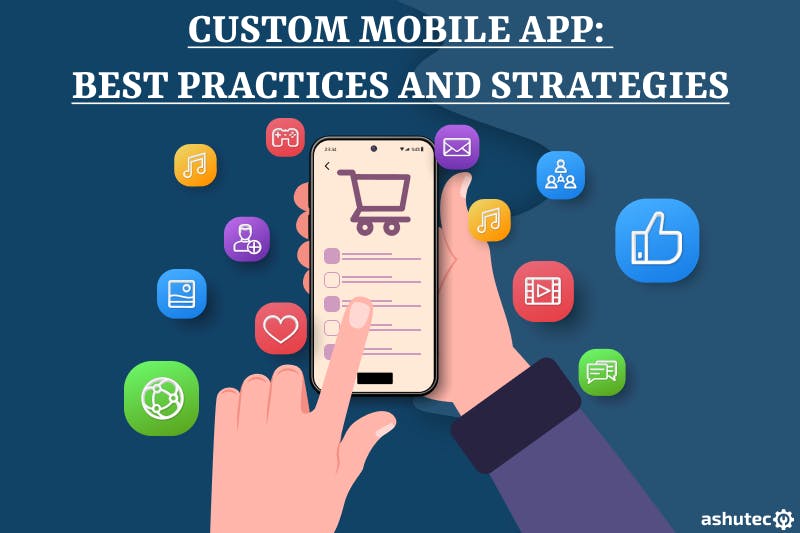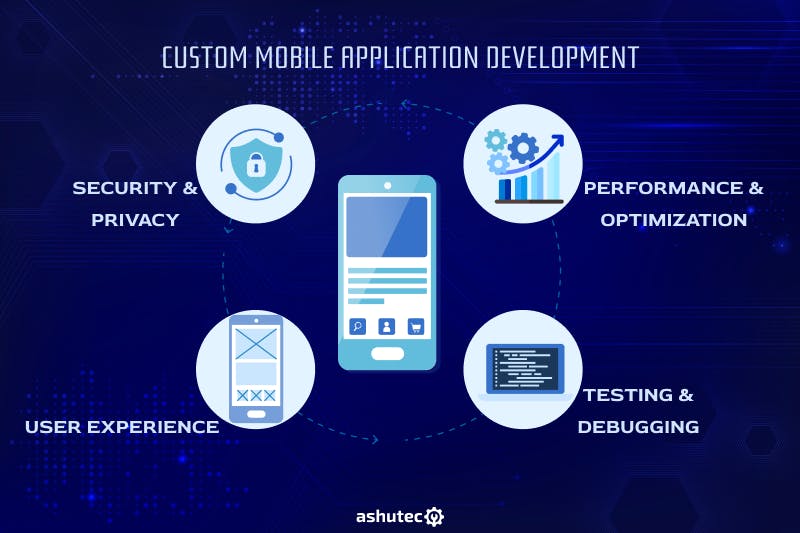Let’s Connect!
Work can be a fun when we know and understand each other well. Let's start conversation to new beginning
+91 63542 35108
To discuss what we can do for you Give us a Call
connect@ashutec.com
Tell us about your next project Write to us

In the digital age, custom mobile apps are crucial for businesses to provide unique user experiences. Learn the benefits of custom mobile app development.
In the modern digital age, mobile applications have become known as an essential tool for companies to connect with their clients and offer the greatest user experience. Custom mobile app development enables businesses to develop apps that are customized to their requirements and offer unique features and functionalities to their users. In this post, we'll examine the advantages of developing custom mobile apps and how they can support corporate expansion and competitive market success.
Customers are more likely than ever to get in touch with businesses through their mobile devices as the world has grown more and more mobile-driven. Businesses must thus adjust to this new reality and give their customers the greatest mobile experience possible. Custom mobile app development has become a popular strategy used by companies to accomplish this objective. Businesses can meet their particular needs, provide their consumers with distinctive features and functions, and remain ahead of the competition by developing custom mobile apps. In this article, we'll explore the advantages of developing custom mobile apps and how companies may use this technology to thrive in the current digital world.
Here are some points to consider while developing a custom application for your business.
An essential component of developing custom mobile applications that provide an intuitive and user-friendly experience is user experience (UX) design. Through user research and data analysis, it is essential to comprehend the target audience and their behavior patterns to accomplish this. Designers can then produce an interface that is user-centric and meets their needs and expectations. The user interface must have an attractive appearance, be simple to operate, and include simple navigational tools such as menus, search bars, and back buttons. Users with impairments can also utilize the app thanks to accessibility features like voice commands, screen readers, and gesture-based controls.
The success of mobile apps depends on providing clear and concise information. The app's content should be straightforward, simple to comprehend, and visually appealing. Businesses can use user testing sessions, surveys, or remote usability testing tools to evaluate the usability of their mobile applications. This assists in locating any interface issues and obtaining suggestions on how to enhance the user experience.
The design of any application gives an impression about the application and you should try to give the best effective UI/UX design to fulfill customers' requirements.
Testing and debugging are essential components of customized mobile app development that must be taken into consideration to ensure the app's success. Without enough testing, the app could be published with bugs or faults that might cause serious problems for customers, resulting in poor user experience and eventually having a negative effect on the company's reputation.
The various types of tests that ensure the app's proper functionality should be carried out by developers to carry out thorough testing and quality assurance. Performance testing is carried out to make sure the app's speed, responsiveness, and stability. Functional testing examines whether the app's features operate as anticipated. To find flaws that could jeopardize the security and privacy of the app, security testing is also essential. On the other hand, usability testing examines the app's general user experience and interface layout.
To ensure compatibility and prevent mistakes, it is also essential to test the app on a variety of platforms and operating systems. To find and resolve any issues that may develop during testing, a variety of tools and approaches that replicate various devices and operating systems can be used.
To ensure a seamless user experience after the app is launched, it is essential to fix any issues or bugs immediately. This can be achieved by keeping an eye on the app's functionality, user reviews, and analytics data, which can assist devs in quickly identifying and resolving any issues. Code errors can also be found and fixed using debugging methods and tools like console logs, debuggers, and profiling tools.
Real users must be included in the testing process since they can offer insightful input on the app's usability and functionality. Beta testing is a successful method for getting a group of people to test an app before it is made public. This gives developers access to valuable feedback that enables them to quickly discover and address any problems.
Security and privacy concerns should be given top priority when developing custom mobile applications. Mobile applications are vulnerable to unauthorized entry or data breaches because they store and handle sensitive user data, such as personal information, financial data, or health records.
There should be strong data encryption and protection methods in place to guarantee the security of the app and user data. This involves utilizing secure protocols for data transmission, employing two-factor authentication, and encrypting data both at rest and in transit. A further way to guarantee that an app is secure and that user data is protected is by adhering to industry standards and compliance laws like GDPR, HIPAA, or PCI DSS.
Implementing safe login and authentication processes is yet another important factor. Features like password policies, biometric authentication, and session control can be a part of this. Additionally, appropriate safeguards must be in place to prevent unauthorized entry to the app and user information.
When developing a custom mobile application, privacy concerns are just as important as security concerns. To give users power over their data, privacy features like data deletion, opt-in/opt-out procedures, or privacy policies should be included. Additionally, it is crucial to make sure that user data is kept securely and that appropriate safeguards are in place to guard against data loss or leakage.
The process of enhancing the application's speed, responsiveness, and general performance to provide a seamless user experience is known as "maximizing performance and optimization" for custom mobile applications. This entails a variety of techniques, including enhancing app performance through caching and data storage techniques, decreasing app size and data consumption, and optimizing app speed and load times.
Code and network requests are optimized as part of app performance and load time optimisation to speed up application loading and improve user experience. This can be done by using the least amount of large video files, making fewer HTTP requests, and employing the right compression methods.
Designing the application to use the least amount of device resources, such as storage space and data consumption, is one way to reduce app size and data usage. This can be done by minimizing the use of resource-intensive functions, employing the proper compression methods, and removing any unnecessary features.
When caching and data storage strategies are used, frequently viewed data is kept in the cache or local storage of the device to speed up data access and enhance application performance. Techniques like in-memory caching, permanent storage, and content delivery networks can be used to accomplish this.
For custom mobile applications to provide a smooth and satisfying user experience, speed optimization, and maximization are essential. Businesses can develop high-performing applications that add value for their users and assist them in achieving their objectives by putting these methods into practice.
As you are now aware of the important factors to be considered while developing a custom application, here are some key points that can help you grow more in development.
It is essential to include features in a customized mobile application that not only improves user experience but also respond to the demands of your target market. Customizable options and settings are a great illustration of a feature that can boost user happiness and engagement. A personalized experience that suits their tastes is made possible by allowing users to change the app's font size, color schemes, or notification preferences.
A further essential function is push notifications and alerts, which can keep users using the app by sending timely information, reminders, or tailored content. Particularly for e-commerce apps, in-app purchases, and payment options offer users a simple and secure method to make purchases inside the application.

Another important feature is social media integration, which allows users to share their app experiences with their social networks and improves app visibility and user acquisition. Other elements that can improve the user experience include offline access and location-based services, which offer tailored content depending on the user's location and offline access to material, respectively. You can give your target audience a tailored and interesting user experience by integrating these essential aspects into your custom mobile application.
Since not all features may be required or advantageous for all apps, it is necessary to carefully assess which ones are most pertinent and useful for your app and target audience.
Businesses can build custom mobile applications that increase the value of their brand and offer the greatest benefits to their users by upholding to best approaches and procedures like designing a user-centric interface, including key features like push notifications and payment options, thoroughly testing and debugging, addressing security and privacy concerns, and optimizing performance.
At ashutec, we specialize in developing unique mobile applications and can offer solutions that are specifically designed to meet your company's needs. To produce high-quality, user-friendly, secure mobile applications that deliver a seamless user experience, our seasoned developers adhere to industry best practices. To find out more about how we can assist you with building a unique mobile application that serves your business needs, get in touch with us right away.

